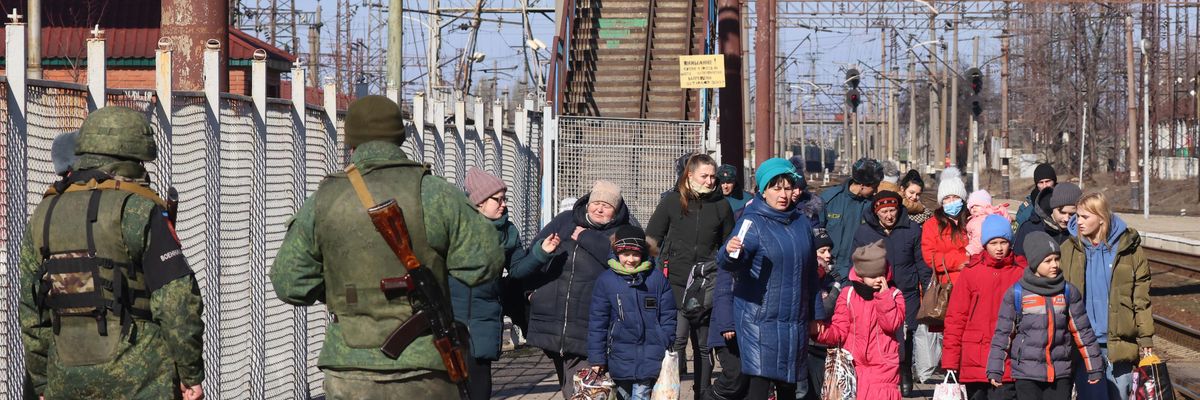The crisis over Ukraine is on the verge of boiling over. Russia has amassed troops on the Ukrainian border, demanding the U.S. promise not to bring Ukraine into NATO. The Biden administration rejects that demand and warns a Russian invasion will be met with harsh economic sanctions.
Although Biden has ruled out the use of U.S. troops in Ukraine's defense, Russian and U.S. military aircraft now jockey dangerously close to the Black Sea. Sanctions themselves, if implemented, would blow up the economy of Europe and quite possibly the world. Before we find ourselves in a war we don't want, it is time for some common sense.
What made Russia's leader, Vladimir Putin, trigger this crisis?
Putin is a brutal authoritarian who has warned for over a decade that Ukraine must not be allowed in NATO. The U.S. ignored reassurances made by previous Russian leaders that NATO would not expand after the Cold War ended and the Soviet Union collapsed.
Then the U.S. was complicit in street protests that led to the overthrow of a democratically elected, if massively corrupt, Ukrainian leader who was leaning toward joining the Russian economic zone. When that happened, Putin dispatched forces to take Crimea and secure its base on the Black Sea. U.S. and its allies then imposed the first level of sanctions.
Ukraine has been intertwined with the Russian Empire and the Soviet Union for centuries. Pundits suggest that Ukraine joining NATO would be like Mexico entering a military alliance with China. The real analogy would be Texas seceding from the U.S. and entering a military alliance with China. For all the Biden rhetoric decrying spheres of influence, no American president would allow that. It isn't surprising that once Russia began to recover its strength, any Russian leader would seek to stop Ukraine from joining NATO.
Why won't the U.S. and NATO simply agree not to include Ukraine in NATO?
The Biden administration says it stands for the principles that any sovereign nation should determine its own course and that NATO will retain an "open-door" policy. These are fine propositions that don't answer the question about NATO's policy.
The NATO alliance provides any one member the virtual guarantee that all will come to its defense if it is attacked. Needless to say, the alliance doesn't and can't accept every country that wants in. If it did, the guarantee would mean nothing. So, why Ukraine?
Obama, Trump and Biden have all made it clear the U.S. won't defend Ukraine militarily. In fact, Ukraine is unlikely ever to be asked to join NATO. With Russia controlling Crimea, Ukraine's borders are in dispute, making it ineligible by NATO's own rules. Ukraine's economy is a basket case, and its politics are utterly corrupt. Over the last 30 years, it has had, by far, the worst economic record of any country in Europe. Ultra-nationalists and neo-fascists are a powerful force driving the current confrontation.
Russia provides over 40% of Europe's natural gas and over 25% of its oil. If sanctions were to disrupt that, it would devastate the Russian economy but also that of Germany and the rest of the U.S.'s European allies. The U.S. would feel the impact, as oil and gas prices soar.
We're risking war or economic disruption because admitting that Ukraine won't be part of NATO would be seen as backing down to Putin's threats. Biden would be savaged by hawks in both parties. Pundits argue that American credibility would be shot, that China would be emboldened to take Taiwan, and that NATO -- if it acknowledged publicly what its actual policy is -- would be finished.
How do we avoid this folly?
Ukrainians would suffer the most from war and economic disruption. The best resolution would be for Ukraine's government to accept it has to find a way to live with its powerful neighbor and also announce it won't seek to join NATO, if Russia affirms its sovereignty and territorial integrity. Germany, France, Russia and Ukraine essentially agreed on that proposition in the so-called Minsk Accords -- but Ukraine and Russia can't agree on who makes the first steps to finalize the deal.
What's needed now is for the people of Russia, Europe and the U.S. to make it clear to their leaders there is no appetite for war or for economic recession -- and demand their leaders find a way out of this mess. War over Ukraine would be tragic and absurd. Sadly, it would not be the first nor the last war like that.
